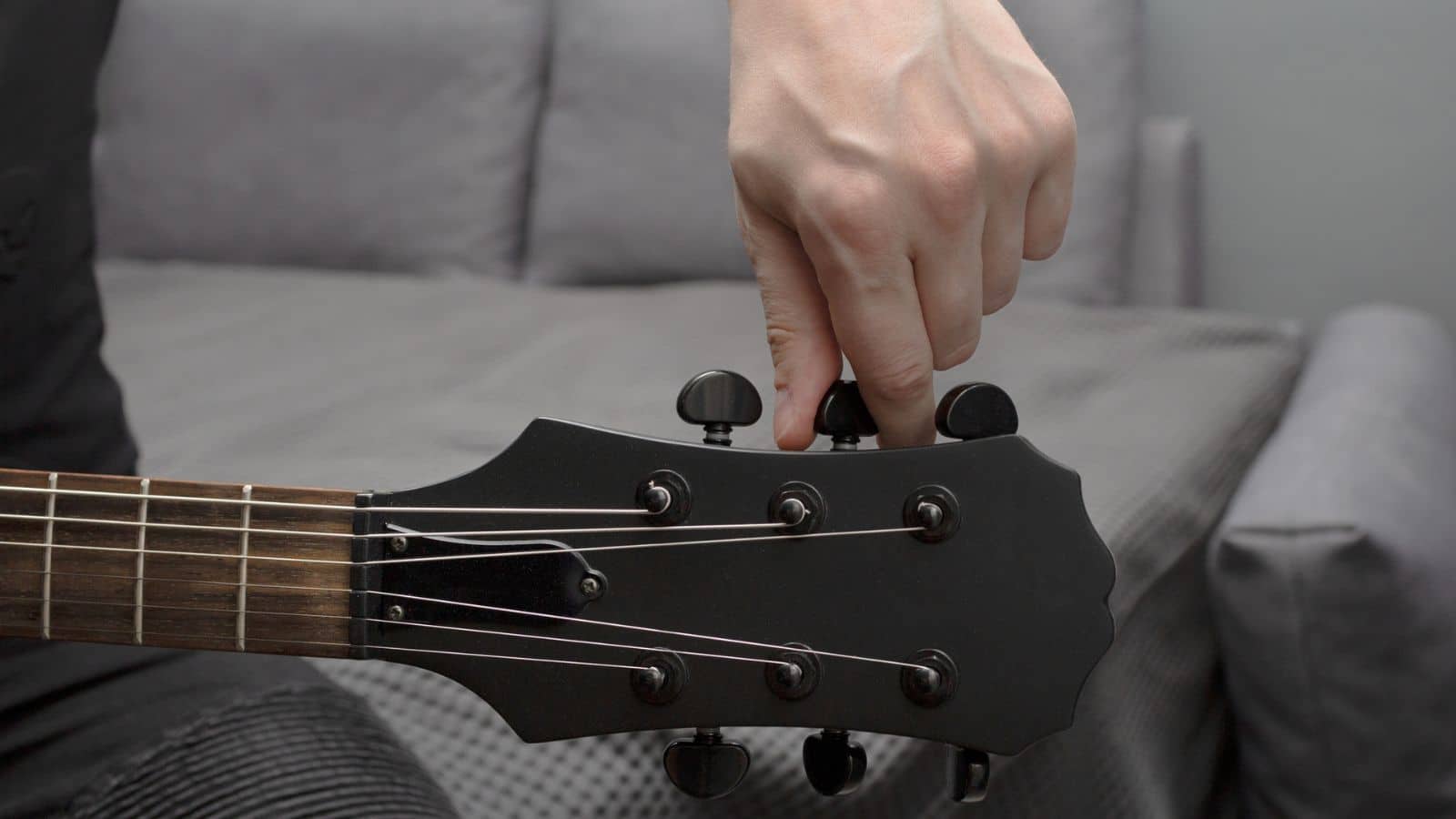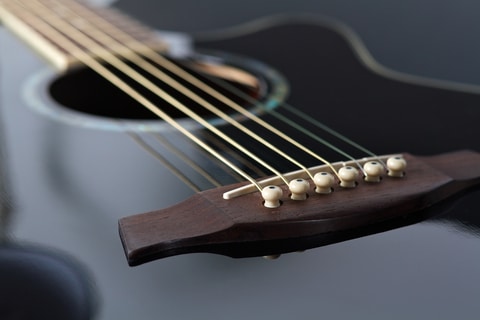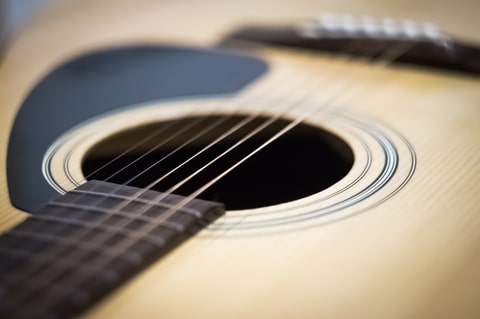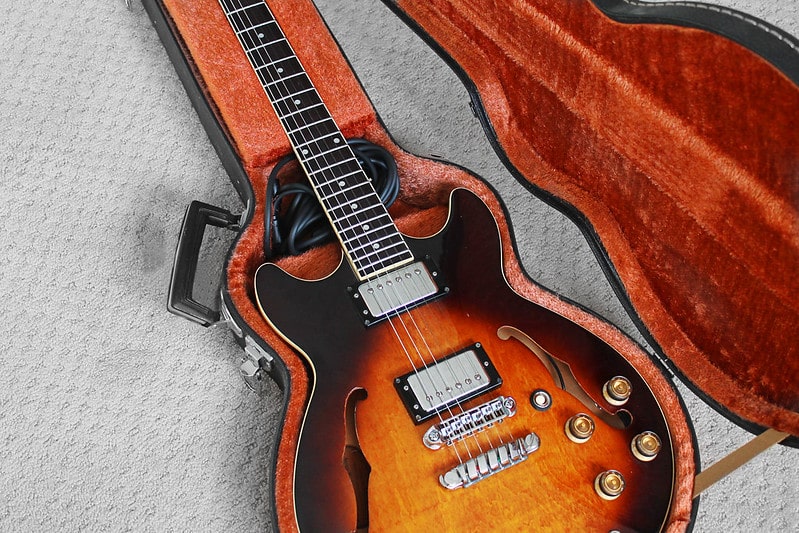
Maintaining the guitar in the best possible condition at all times should be your top priority, and all you need to do is check that you are performing the maintenance correctly.
The same principle applies while tuning the guitar and maintaining the strings in their current position. You must ensure that your guitar is precisely tuned following your preferences if you will use it for any performance.
It is done so that you can have a more enjoyable time playing your guitar and one that is completely sturdy.
However, if you are not playing the guitar and would like to put it away for some time, that can be an issue; in that case, you would need to make sure that you are taking proper care of the instrument during the time that it is not being played.
When not playing the guitar, there is no requirement to loosen the guitar strings. It is both a general and specific statement.
Your guitar’s neck has been constructed so that it can withstand the appropriate range of string tension generated while you are tuning your guitar.
Additionally, guitars have been constructed so that their tune will remain intact regardless of whether they are being played, placed in a case, or hung on a wall.
One of the questions guitarists ask one another the most frequently is how much they should loosen the strings. It is because guitarists want to know if they can put the tuned guitar away for a while or if they should relax the strings a little bit.
There are a few things that you need to understand about it, and here are some of the options that would be ideal for you:
Explaining String Tension
When the guitar is not being played, it is important to detune it so that it does not cause harm to either the neck of the instrument or the strings themselves. This will keep the instrument in good condition for future usage.
According to another school of thought, Alterations in humidity can substantially damage a guitar over time if it is played in its fully tuned position. To our great relief, this is not the case.
Not only does consistent detuning raise the risk of neck injury, but it also has the potential to accelerate the wear and tear on your guitar’s nut and strings.
Although a guitar’s nut and strings can be easily replaced, there is still no reason to damage the instrument unnecessarily. To put it another way, your guitar’s construction ensures that it will maintain its tuning.
The strings indeed apply strain to the neck of the guitar, and it is also true that an excessive amount of tension applied to the neck over a protracted period can cause it to bend, bow, or warp.
Should You Loosen Guitar Strings When Not Playing?
Is it Necessary?
When not in use, you don’t need to loosen the guitar strings; doing so is completely optional. The neck of the guitar is built to withstand a certain amount of tension.
It has just the appropriate amount of flexibility built into it to guarantee that your instrument does not experience any issues due to the tension created between the strings.
Because of this, you do not need to be concerned about the fact that your guitar will be stored with some strain on the strings.
It doesn’t matter if you hang the guitar on the wall or keep it stored in the case you bought for it; both options are okay. You may just let the strings loose, and doing so will not cause you any problems, such as damaged strings or other issues of a similar nature.
Because of this, you should not worry too much about it and instead just let the guitar maintain its tuned pitch.
Consider Guitar Brand
Another important aspect to consider is the guitar’s make and the quality of its construction. Some more affordable variants are constructed out of laminated plywood, while the more expensive ones are created out of solid wood.
Compared to a solid piece of wood, the humidity will have a much higher impact on a guitar manufactured from laminated sheets.
If the guitar strings on your instrument are too loose, the device could start to move as a result of dryness as well as other forces like gravity. It is a typical problem with laminated guitar necks and can cause the neck to bow oppositely.
When you do decide to play it again, the neck is going to need some time to relax so that it can handle the increased tension.
If you keep the strings in a taut position, the neck will remain vertically aligned and straight as long as you do so. It is good for your instrument because the truss rod inside your neck is built to handle the force being applied.
Therefore, if you have a guitar of poorer quality, it is best to keep your strings in a taut position.
When Should You Lose Them Up?
Another thing that you will need to be aware of is that there are times when you might need to loosen the strings to get the perfect experience that you might be looking for.
It will get you the ideal expertise you might be seeking, and it will also be the right thing to do to ensure that the strings do not end up breaking.
Therefore, to achieve this goal, you will need to loosen the strings on the guitar while you are going. It is because there may be some jerks along the way that will cause the strings to become looser, resulting in the guitar losing its tuning.
But there is also a possibility that the strings will snap due to the sustained stress between them and the jerks that are applied.
Because of this, you need to ensure that you are loosening the strings, whether you are traveling or keeping the guitar hanging about for an extended period. It is because it is a better alternative for you.
It may be difficult for you to tune your guitar if it has been kept in tune for a lengthy period. The extended tension between the strings may cause them to experience issues such as becoming damaged or breaking due to the strain placed on them.
If you do not intend to play the guitar for an extended period, you may want to consider warming up the fingers first.
Leave It Tuned
If, on the other hand, you play the guitar every day or you don’t take long breaks between the guitar sessions, then you can leave things as they are and not have to worry about anything.
If you don’t take long breaks between playing the guitar sessions, you should change things up a bit.
All that is required of you is to take care of the instrument and store it in a location where it will not be subjected to any direct impact from anything else in the environment.
You won’t need to worry about anything once you do that because you won’t have to go through the trouble of getting your guitar tuned over and again.
You can avoid the hassle you don’t want to have to deal with by repeatedly tuning your guitar using this method, which is simply the best and most convenient way to do it.
Just remember to treat your guitar respectfully and avoid dropping it when tuned, as the strings will be under significant tension at that point. Take good care of it!
Don’t Sweat It
It is unnecessary to worry about the strings becoming loose during shorter storage durations.
If you pick up your guitar daily and play it, you won’t need to adjust the tension of the strings after every performance. It indicates that the tension in the string is always present.
The only significant distinction is that you won’t be able to tell whether a problem is developing while the item is being stored. This last point is essential to consider.
The string tension is constant, and as a result, an instrument may require occasional little truss rod adjustment to compensate for the slight “succumbing” of the neck.
If you play the guitar or have it set up regularly, you will (hopefully) notice this slow change and be able to modify it so that the equalization is maintained.
The Bottom Line
Now that we have reached the end of this post, the only thing I want you to take away from it is that although it is not necessary to loosen your guitar strings when not in use, I have always recommended doing so if you are not using your guitar for a long time.
It is because the tension on the strings can weaken over time and cause damage to your instrument.
You can also merely loosen all the strings one or two half steps to be on the safe side while considering the two different perspectives.
Be aware, as well, that there is a lot of controversy surrounding this topic and that the care you provide your instrument daily is a much higher priority than any cleaning or maintenance you perform once every two months.






